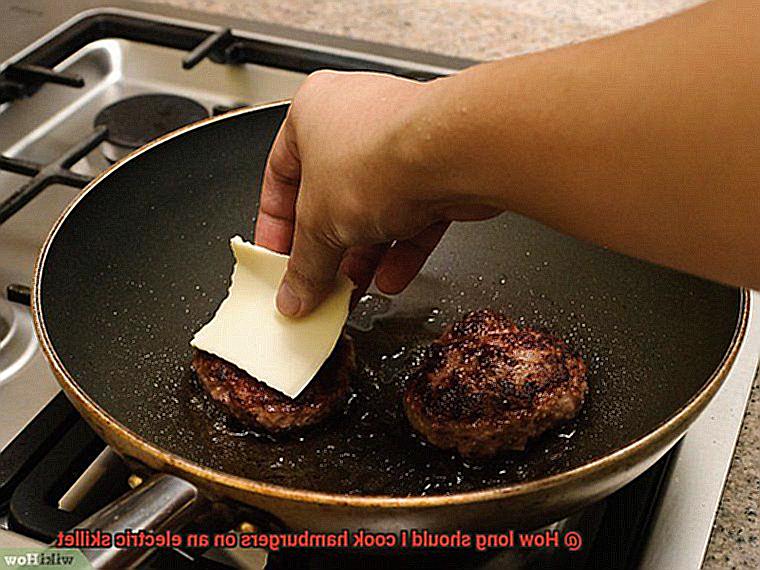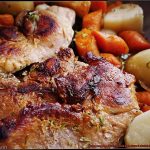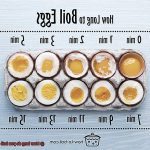Summer is just around the corner, and that means one thing: burgers. But what if you don’t have access to an outdoor grill or simply prefer to cook indoors? Fear not, because an electric skillet can be your best friend when it comes to cooking up juicy burgers without the hassle of outdoor cooking. The question is, how long should you cook hamburgers on an electric skillet? Don’t worry; we’ve got you covered.
To start with, it’s important to remember that burger cooking times depend on several factors, including the thickness of the patty, the temperature of the skillet, and your desired level of doneness. A thicker patty will take longer to cook than a thinner one, while higher temperatures will speed up the process. However, what really matters is the internal temperature of the meat – aim for 160°F for a safe and delicious burger.
In this post, we’ll break down everything you need to know about cooking hamburgers on an electric skillet – from ideal cooking times for different types of burgers to tips on achieving that perfect level of doneness. Get ready to impress your friends and family with mouth-watering burgers that are sure to rival even the best backyard grill. So grab your electric skillet and let’s get started.
Contents
Factors to Consider when Cooking Hamburgers on an Electric Skillet
Cooking hamburgers on an electric skillet can be a great way to achieve just that. However, there are a few factors to consider before you start cooking. Here are some tips to ensure your hamburgers turn out perfectly every time.
Thickness of the Patty
The thickness of your patty is a crucial factor to consider when cooking hamburgers on an electric skillet. A general rule of thumb is to cook each side for 4-5 minutes for a 1-inch thick patty. However, thicker patties may require more time to cook through properly. Remember, the thicker the patty, the longer it takes to cook.
Temperature of the Skillet
Preheating your electric skillet before adding the patties is essential to ensure even cooking and prevent sticking. The ideal temperature for cooking hamburgers on an electric skillet is around 375°F. You can check the temperature of your skillet using a thermometer or by dropping a small amount of water onto the surface. If the water sizzles and evaporates quickly, the skillet is hot enough.
Type of Ground Beef
The type of ground beef used can affect cooking time. Leaner ground beef will cook faster than fattier options because there is less fat to render and cook through. A good rule of thumb is to cook leaner burgers for about 3-4 minutes per side, while fattier burgers may require 5-6 minutes per side. Keep in mind that different types of ground beef require different cooking times.
Additional Ingredients
Adding ingredients such as onions or cheese can add flavor to your burger patty. However, these ingredients can also affect the cooking time, requiring adjustments to ensure that the patties are cooked through properly.
Meat Thermometer
Using a meat thermometer is always the best way to ensure that your hamburger is cooked to a safe temperature. The USDA recommends cooking ground beef to an internal temperature of at least 160°F. To use a meat thermometer, insert it into the center of the patty and make sure it reads at least 160°F before removing it from the skillet. This will ensure that your burgers are safe to eat.
Avoid Pressing Down on the Patties
Resist the temptation to press down on your patties with a spatula while they’re cooking. This can cause them to become dry and lose flavor. Instead, let them cook on each side without any interference.
Estimating the Time Needed for Different Levels of Doneness
Few things are more satisfying than a juicy, mouth-watering burger. But getting the perfect level of doneness can be tricky, especially when cooking on an electric skillet. Fear not, for I am here to help you master the art of estimating the time needed for different levels of doneness when cooking hamburgers on an electric skillet.
To start, there are a few factors that will affect cooking time, such as the thickness of the patty, the temperature of the skillet, and personal preference. However, there are some general guidelines you can follow for achieving different levels of doneness.
For a rare burger, cook for approximately 2-3 minutes per side. For a medium-rare burger, cook for approximately 3-4 minutes per side. For a medium burger, cook for approximately 4-5 minutes per side. And for a well-done burger, cook for approximately 5-6 minutes per side. These times are only estimates, so it’s important to use a meat thermometer to ensure that the internal temperature of the burger has reached at least 160°F for food safety purposes.
One key step to achieving perfectly cooked burgers is to let them rest for a few minutes after cooking. This allows the juices to redistribute and results in a more flavorful and juicy burger. Trust me, it’s worth the wait.
When cooking on an electric skillet, preheating is crucial to ensure even cooking and prevent sticking. Heat the skillet to medium-high before adding your patties. Avoid pressing down on your burgers with a spatula while cooking, as this will cause juices to escape and leave you with a dry burger.
The Importance of a Meat Thermometer
A perfectly cooked burger is a thing of beauty – succulent, juicy, and bursting with flavor. But cooking hamburgers on an electric skillet can be a tricky task. Overcooked burgers can easily become dry and tough, while undercooked burgers can be dangerous to consume as they may contain harmful bacteria. This is where a meat thermometer comes in handy.
As an expert in the culinary world, I can tell you that using a meat thermometer when cooking hamburgers on an electric skillet is absolutely essential. Let’s take a closer look at why:
Meat thermometers take the guesswork out of cooking
When it comes to cooking hamburgers, precision is key. A meat thermometer allows you to measure the internal temperature of the burger accurately, ensuring that it’s cooked to the perfect temperature every time. No more guessing or relying on color alone.
Don’t be fooled by color
Many people make the mistake of relying on color to determine whether their burger is fully cooked or not. However, hamburgers can still be pink in the middle even when they’re fully cooked. By using a meat thermometer, you can be sure that your burgers are safe to eat without compromising their taste and texture.
The juicier, the better
The hallmark of a great burger is its juiciness. Overcooking your burgers can cause them to lose their moisture and become dry and flavorless. Using a meat thermometer ensures that your burgers are perfectly cooked, retaining their juiciness and flavor.
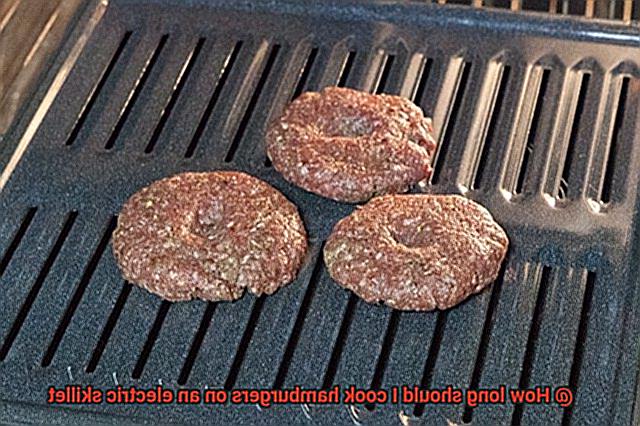
To use a meat thermometer when cooking hamburgers on an electric skillet, simply insert the probe into the center of the burger, taking care not to touch any bones or the bottom of the skillet. The temperature should read 160°F for fully cooked burgers.
Preheating the Skillet
Preheating your electric skillet is essential to ensuring that your burgers are evenly cooked and deliciously juicy. It’s recommended that you preheat your skillet for at least 5-10 minutes on medium-high heat before adding your patties. Don’t rush this step, trust us, it’s totally worth it.
When your skillet is heated to the right temperature, it creates a seared crust on the surface of the burger, which locks in all of those mouth-watering juices and flavors. But that’s not all. Preheating also prevents sticking, ensuring that your burgers come out perfectly every time.
To check if your skillet is ready, sprinkle a few drops of water onto the surface. If the water sizzles and evaporates immediately, then you’re good to go. But wait, there’s more. Lightly oil or butter the surface of the skillet before adding your burgers to add even more flavor and prevent sticking.
In summary, here are the essential steps to cooking the perfect burger on an electric skillet:
- Preheat your skillet for at least 5-10 minutes on medium-high heat.
- Test if your skillet is ready by sprinkling a few drops of water onto the surface.
- Lightly oil or butter the surface of the skillet.
- Add your burgers and cook to perfection.
Avoid Pressing Down on Patties While Cooking
We have some expert tips to help you avoid a common mistake that can ruin your perfect patty – pressing down on the patties while cooking.
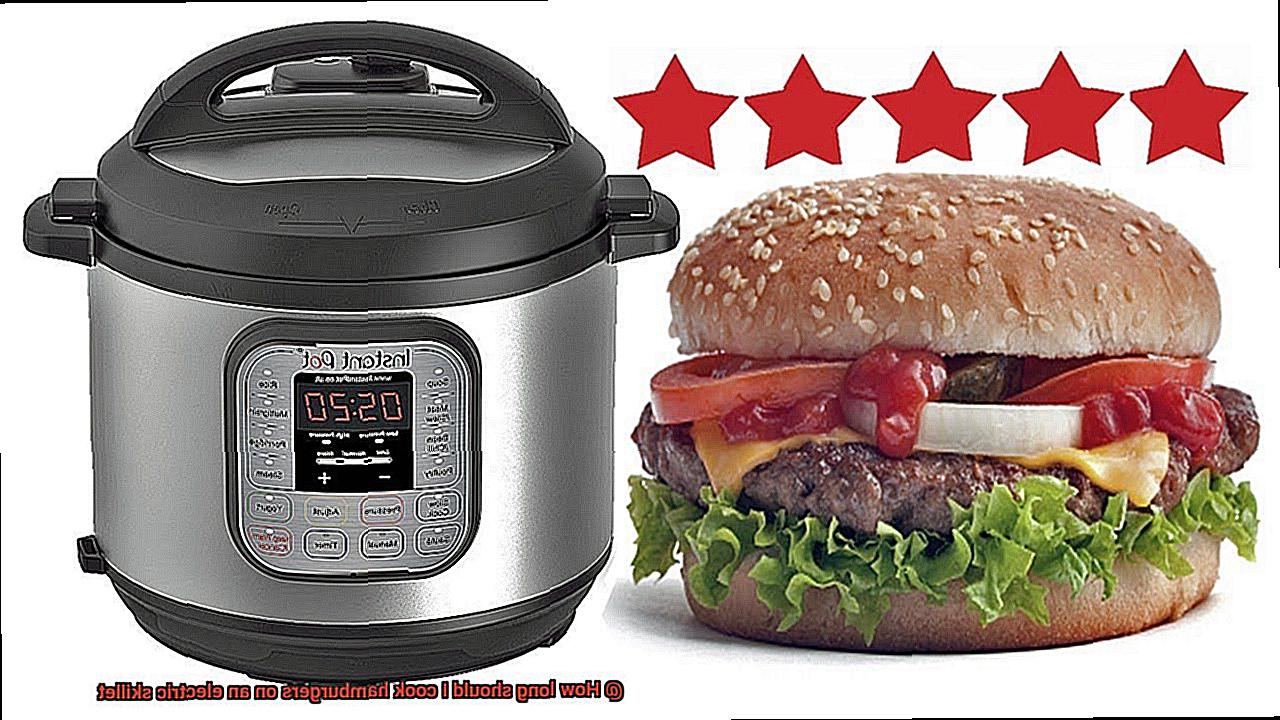
It’s understandable to want to speed up the cooking process or ensure that your burger is fully cooked, but pressing down on the patties is not the way to go. Here’s why:
- Loss of Juices: When you press down on the patty, you’re essentially squeezing out all the flavorful juices. This leads to a dry and less tasty burger, which nobody wants. So, let’s keep those juicy flavors locked in.
- Uneven Cooking: Flattening the patty creates thinner areas that will cook faster than others, leading to uneven cooking. You’ll end up with dry and tough areas while some parts remain raw. Not exactly what we’re going for.
But fear not, burger lovers. Follow these simple tips to avoid these negative effects:
- Properly Shape Your Patties: Before placing them on the skillet, make sure to give your patties a slight indentation in the center. This will prevent them from puffing up while cooking, ensuring an even cook.
- Resist The Urge To Press Down: Keep those juicy flavors locked in by avoiding pressing down on the patties while cooking. No matter how tempting it may be, resist.
- Use A Meat Thermometer: To ensure your burgers are cooked through without having to press down, use a meat thermometer to check the internal temperature.
By following these tips, you’ll be able to create delicious and perfectly cooked burgers every time. Say goodbye to dry and uneven burgers and hello to juicy perfection.
Letting the Patties Rest After Cooking
Burgers are a classic American food that has been enjoyed for generations. The perfect burger should be juicy, tender, and packed with flavor. However, achieving this ideal burger requires more than just cooking the patty to the right temperature. The secret ingredient is letting your patties rest after cooking.
When you cook a burger on an electric skillet, the heat causes the juices inside the patty to move towards the center. If you cut into the burger immediately after cooking, all those flavorful juices will escape, leaving you with a dry and bland burger. Don’t let that happen to you.
To prevent this culinary catastrophe, it’s crucial that you let your patties rest for a few minutes after cooking. This allows the juices to redistribute throughout the meat, resulting in a juicier and more flavorful burger.
The amount of time you should let your patties rest depends on their thickness. A good rule of thumb is to let them rest for about 5-10 minutes. If you’re cooking thicker patties, you may need to let them rest for a bit longer.
During this resting period, you can prepare your buns and toppings. This not only gives the burgers time to rest, but also allows you to assemble them while they’re still warm. Plus, it builds anticipation for that first delicious bite.
Tips for Perfectly Cooked Hamburgers Every Time
Fear not, with the right tips and techniques, you can achieve perfectly cooked burgers every time. Here are five subtopics to help you master the art of cooking hamburgers on an electric skillet:
The importance of preheating your electric skillet:
Preheating your electric skillet to the appropriate temperature is crucial for evenly cooked burgers. The ideal temperature for cooking hamburgers on an electric skillet is around 375°F to 400°F. Make sure to invest in a meat thermometer so that you can gauge the heat accurately.
Don’t overcrowd your skillet:
Overcrowding your skillet can lead to uneven cooking and steaming of the burgers. It’s better to leave space between each burger to allow for proper heat distribution. If necessary, cook the burgers in batches to ensure they cook evenly and get that delicious sear.
Don’t overcook your burgers:
Overcooking your burgers can result in dry and tough meat. For perfectly cooked burgers, aim for about 4-5 minutes per side for medium-rare, 5-6 minutes per side for medium, and 6-7 minutes per side for well-done. However, always use a meat thermometer to ensure that the internal temperature of the burgers reaches 160°F – a safe temperature for consuming ground beef.
Resist the temptation to press down on your burgers:
Pressing down on your burgers with a spatula can cause all the juices to escape, resulting in a dry and flavorless burger. Instead, let them cook undisturbed on one side for the recommended time before flipping them over to cook on the other side.
Let your burgers rest:
After cooking your burgers, let them rest for a few minutes before serving them. This allows the juices inside the patty to redistribute, resulting in a juicier and more flavorful burger. Transfer the burgers to a plate or cutting board and cover them with aluminum foil while they rest.
FJ0IhAVI0ME” >
Conclusion
In conclusion, crafting the ultimate hamburger on an electric skillet is an art form that requires precision and attention to detail. The thickness of your patty, the temperature of your skillet, the type of ground beef, and any additional ingredients all play a crucial role in determining cooking time.
To ensure even cooking and prevent sticking, preheating your skillet is key. Resist the urge to press down on your patties while cooking to retain their succulence and flavor. Allowing them to rest for a few minutes after cooking will result in a more flavorful burger as the juices redistribute throughout the meat.
Cooking times for different levels of doneness can be estimated using general guidelines, but using a meat thermometer is essential to ensure that your burgers are cooked to a safe temperature of at least 160°F. And remember: overcrowding your skillet is a recipe for disaster. Cook burgers in batches if necessary.
By following these expert tips and techniques, you’ll be able to create mouth-watering hamburgers that rival even the most seasoned outdoor grill masters.

